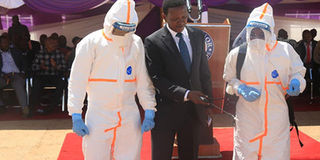Let medical scientists, media fight the lies

Machakos Governor Alfred Mutua demonstrating the county’s preparedness in the fight against coronavirus. PHOTO | LILIAN MUTAVI | NATION MEDIA GROUP
What you need to know:
- Over the past week or so, many journalists have had to interact with medical science.
- Covid-19 is a pandemic in the Digital Age; which, therefore, makes it different from previous pandemics, thanks to social media.
As the threat of a Covid-19 pandemic becomes a reality to Kenyans, the media must face up to the fact that they are no longer non-participant observers.
With a disease that has killed more than 10,000 people and counting and infected more than 250,000 worldwide, this should be the scale that tips the ‘Fourth Estate’ to collaborate better with medical scientists.
Over the past week or so, many journalists have had to interact with medical science. Some have been calling to confirm and verify information while others were looking for stories. Most Kenyans have been searching online from multiple sites and utilising both electronic and print media, for information around Covid-19.
HEALTH CRISIS
As medical scientists, we acknowledge that fake news on Covid-19 is spreading faster than the virus and we call for a halt to these emerging “infodemics”. As we admit that the novel coronavirus disease is the worst public health crisis our country has faced since Independence, we send out a humble appeal for sobriety in media coverage of the epidemic.
Media outlets should ensure they get scientific verification and input to avoid publishing glaringly scientifically wrong stories. In addition, they should consider hiring medical correspondents to ensure scientific validity of information they put out to their audiences.
I started to worry when my house help asked me if it is true that government officials are not reporting Covid-19 cases. She further asked me (as a Kenyan doctor) why we are not telling our fellow citizens that there is a drug that cures the virus.
As I interrogate her on where she had got the information, I scolded her, telling her it was fake news. But I would get even more worried when I saw a local daily’s headline stating that we have a confirmed cure instead of making a disclaimer of ‘hope of cure’ as the said drug is still under investigation.
FALSE INFORMATION
What happened next was just as interesting. Pharmacies across the city were running out of the medicine, depriving patients with autoimmune connective tissue conditions, who depend on it, access to it. It seems many information outlets only look for a sensational angle rather than scientific facts or opinions. These are the lies the public is being fed regarding the origin, nature and spread of Covid-19. Let us be aggressive in combating false information.
Covid-19 is a pandemic in the Digital Age; which, therefore, makes it different from previous pandemics, thanks to social media. But now, the World Health Organisation warns that false news was “spreading faster than the virus”. Claims have been made that the virus is spread by committing sin or could be cured by garlic or drinking a hand sanitiser or sanitising the gut with large amounts of hard liquor!
At this rate, we might have to fight the coronavirus outbreak on two fronts: The viral pandemic and the informational epidemic. Rather than be passive recipients of news, we have to become critical and push back on all information that sounds ‘crazy’ and ‘conspiratorial’.
The educated class, including scientists and journalists, should take the lead in this. Both the medical and communication scientists must team up against the challenge.
Dr Gachemba is a physician (internal medicine) and health advocate. [email protected].





